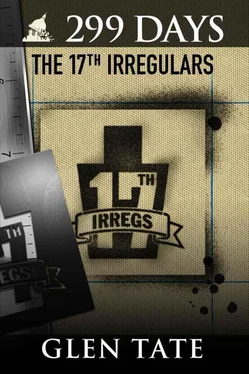“Do walk-ons need military experience?” Grant asked.
“Not really,” Ted said. “However, it’s a huge plus. If you get some AWOL FUSA guys, I’m interested. AWOL cops would be another good find. But I’m interested in people with engineering, construction, machining, and agricultural backgrounds. Of course medical is always welcomed. We need to have a mini town out at the Marion farm for months before we deploy. We need people with…” Ted searched for the right term.
“Town-running skills,” Grant said. It wasn’t exactly a military term, but Grant wasn’t exactly a military person.
“Yeah,” Ted said, “‘Town-running skills.’ We’re like Pierce Point: we need people who know how to keep a town running. We’ll hand them a rifle before we deploy. We’re an irregular unit, not Delta Force. But we need people with important camp skills or skills we’ll need in the city we’re occupying.”
“People with town-running skills will be assigned to your civil affairs team, Grant, and they can go solve those problems in the city we take,” Ted stated.
It sounded weird to Grant to hear Ted say “your civil affairs team,” but totally normal at the same time. It was weird because now they were the civil affairs team, with no formal training whatsoever. But not weird because it just made sense and serving in the civil affairs role had basically been assumed ever since Ted and Sap arrived that first night on the beach.
“What about fidelity to the cause?” Grant asked. “‘Cause that will be hard to assess with certainty as we’re interviewing them at the gate.”
“That’s a tough one,” Ted said. “You can’t polygraph them at the gate.” Ted paused. “Do the best you can on the fidelity issue. I suspect most people coming to the gate, wondering around with nothing, aren’t exactly thinking about politics. They’re like the homeless dudes the government paid to go out and protest and intimidate people at the beginning of the Collapse. Well, we can do the same. We can say to people ‘Want to be fed and have a mission in life? Come with me.’” Ted felt bad using people who were in a bad situation, but war was a bad situation. Winning it was what counted.
Sap added, “We’ll have some pretty good controls in place in the camp for making sure recruits aren’t communicating with Limas or anyone else. Even if we get someone who is a Lima, we’ll be able to handle him. So, take the risk at the gate and we’ll correct it in camp if necessary.”
“The walk-ons coming to the gate can’t be told what we’re doing out here, of course,” Grant said. Everyone nodded. “We have the cover story of the ‘rental team.’ But that raises another problem.”
“Shanghai,” Ted said.
“Exactly,” Grant said, amazed that Ted predicted what he was thinking. But, then again, Ted was a professional.
“Huh?” Scotty said. “Shanghai? As in the city in China?”
“Yep,” Grant said. “You know, ‘shanghai’ is the term for when people get tricked or forced to join an army. They get ‘shanghaied’ and have to serve against their will. I think it came from a few hundred years ago when the British Navy would nab people and take them off to Shanghai and force them to serve.”
“Oh, right,” Scotty said. He’d heard the term before.
“We run into this all the time in indigenous guerilla units,” Ted said. “We have volunteers come to us, but we can’t tell them, at least at first, what we’re doing and where we’re doing it. So we take them into the unit without giving them full disclosure of what’s going on. But, what if they don’t want to be a soldier? We can’t let them out of the camp and we can’t spare the personnel to guard them at the camp while the unit is on the march. Plus, our guards watching them would be left behind in what might be enemy territory. And we can’t have that.”
Wow. This sucked, Grant thought. This war thing wasn’t easy. It was full of problems. It wasn’t like a video game, or like people just join up with the good guys and everything is fine. There are complications and moral questions. War was full of shitty situations.
“Thoughts?” Ted asked. He and Sap had a plan for this, and HQ had come up with some guidelines before they’d departed for Pierce Point, but Ted wanted to see what the Pierce Point guys came up with. It was quiet for a while.
Grant decided to pipe up. His rental team cover story went over so well that he was more confident in giving his suggestions.
“Well, these walk-ons are being told they have a job on the ‘rental team,’ right?” Grant said. “They know they’ll be fighting and will be exposed to danger. They could be told that the rental team will not be hired out to government; just to citizens defending themselves.”
Ted and Sap were smiling. They knew what Grant was about to say.
“Go ahead,” Ted said.
“So,” Grant said, “the walk-ons know that they’ll be fighting—but not for the government.” He sensed he was giving the right answer which made him speak even more confidently.
“This means,” Grant continued, “the walk-ons know that what they’re doing is totally illegal and the Limas could kill them on the spot. So, when they are told the rental team story, they basically know everything they need to know: They’re fighters, not for the government, and they’re breaking the law. They need to be cool with that.”
Ted and Sap looked at each other and smiled.
“Exactly,” Ted said. “The walk-ons, by being told they’re a ‘rental team,’ basically know everything they need to know to volunteer for the Patriots; not fully everything, but enough that if they hesitate at being on an outlaw rental team, then they don’t want to be in a Patriot irregular unit either.”
Grant had one more pressing question.
“What do we do if one of the walk-ons finds out what we’re doing out there and then doesn’t want to be in the unit?” He asked. “We’d have to keep them guarded at the farm. That would suck. I mean, we can’t shoot them, can we?” Grant was implying they could.
“No, we don’t shoot them,” Sap said, disappointed that Grant had come up with that.
“We’ve found that, once men come into camp, they don’t regret it,” Ted said. “They have a job and nowhere else to go. Camaraderie develops. We work hard on that. We foster camaraderie. I’ve seen reluctant men turn into a band of brothers. So, odds are we won’t have this problem.”
“But what if we do?” Grant asked. He knew that they needed a plan for every problem they could think of in advance, which wasn’t even all the problems they’d actually face. But, at least they’d have a plan for the foreseeable problems and what to do with reluctant fighters was one of those problems.
“In the past,” Sap said, “we’ve had a few personnel stay behind in the camp, if that’s possible, and guard the people who refuse to go out with the unit and fight.”
“What if it’s not possible?” Grant asked.
“Well, in this particular situation, Pierce Point, that is,” Ted said, “you have a jail, right?”
Grant nodded.
“We throw them in the Pierce Point jail,” Sap said.
“What if they talk about how they just left a Patriot irregular camp run by Special Forces located out at Marion Farm?” Grant asked.
“We tell everyone that they’re crazy,” Ted said. “Hell, we’ll lock them up in the mental ward you got out here.” Ted thought some more and said, “And, if the unit is out of the camp and on the march, there’s less damage they can do to us by talking. We’re already out of the area.”
Everyone nodded. That sounded like a decent solution; better than shooting them.
It was silent again. After a while, Grant came up with another question.
Читать дальше











